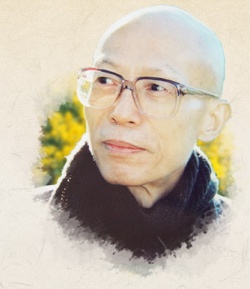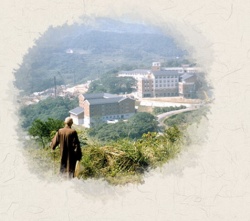Difference between revisions of "Sheng Yen"
(Created page with " <poem> Master Sheng Yen was born in Nantong, {{Wiki|Jiangsu Province}}, China in 1930, and became a novice at Guangjiao Monastery on the {{Wiki|Wolf}} Hil...") |
|||
| Line 1: | Line 1: | ||
| − | + | [[File:M14r.jpg|thumb|250px|]][[File:Ma45r2.jpg|thumb|250px|]] [[File:M457r3.jpg|thumb|250px|]] | |
<poem> | <poem> | ||
| − | [[Master]] [[Sheng Yen]] was born in Nantong, {{Wiki|Jiangsu Province}}, [[China]] in 1930, and became a [[novice]] at Guangjiao [[Monastery]] on the {{Wiki|Wolf}} Hill in 1943. In 1949, he joined the Nationalist {{Wiki|Army}}, which later retreated to {{Wiki|Taiwan}}. After serving ten years in the {{Wiki|military}}, he was finally discharged from the {{Wiki|army}} and re-ordained by [[Venerable]] [[Master]] Dong Chu. | + | [[Master]] [[Sheng Yen]] was born in Nantong, {{Wiki|Jiangsu Province}}, [[China]] in 1930, and became a [[novice]] at Guangjiao [[Monastery]] on the {{Wiki|Wolf}} Hill in 1943. In 1949, he joined the Nationalist {{Wiki|Army}}, which later retreated to {{Wiki|Taiwan}}. After serving ten years in the {{Wiki|military}}, he was finally discharged from the {{Wiki|army}} and re-ordained by [[Venerable]] [[Master]] [[Dong Chu]]. |
As a [[novice]], [[Master]] [[Sheng Yen]] had already [[realized]] that “the [[Buddhadharma]] is so great, yet so many [[people]] misunderstand it and so few [[people]] are willing to accept it.” He attributed this [[phenomenon]] to a lack of talent in spreading the [[Buddhadharma]]. Therefore he decided to do a {{Wiki|solitary}} [[retreat]] in the mountainous area of Meinong, in Kaohsiung, which lasted six years altogether, and later, to pursue further studies at Rissho {{Wiki|University}}, in [[Japan]], where he was awarded a PhD in {{Wiki|Literature}} in 1975. | As a [[novice]], [[Master]] [[Sheng Yen]] had already [[realized]] that “the [[Buddhadharma]] is so great, yet so many [[people]] misunderstand it and so few [[people]] are willing to accept it.” He attributed this [[phenomenon]] to a lack of talent in spreading the [[Buddhadharma]]. Therefore he decided to do a {{Wiki|solitary}} [[retreat]] in the mountainous area of Meinong, in Kaohsiung, which lasted six years altogether, and later, to pursue further studies at Rissho {{Wiki|University}}, in [[Japan]], where he was awarded a PhD in {{Wiki|Literature}} in 1975. | ||
| Line 11: | Line 11: | ||
The establishment of [[Dharma Drum Mountain]] | The establishment of [[Dharma Drum Mountain]] | ||
| − | With the rapid development and expansion of the [[Chung-Hwa]] Institute of [[Buddhist Studies]] and the | + | With the rapid development and expansion of the [[Chung-Hwa]] Institute of [[Buddhist Studies]] and the [[Nung Chan Monastery]] in their educational and {{Wiki|cultural}} undertakings, as well as their work in spreading the [[Dharma]], there was no longer enough [[space]] to house them and therefore [[Master]] [[Sheng Yen]] established the [[Dharma Drum Mountain]] [[World]] Center for [[Buddhist Education]] in Jinshan Township, Taipei County, in order to realize the Threefold Education—Extensive {{Wiki|Academic}} [[Education]], Extensive Public [[Buddhist Education]], and Extensive {{Wiki|Social}} Care Education—which is the foundation on which to realize the [[vision]] of “uplifting the [[character]] of [[humanity]] and building a [[pure land]] on [[Earth]]”. The first phase of the construction for the Center was completed in 2005, and an inaugural {{Wiki|ceremony}} was held. |
Based on his [[profound experience]] of [[Chan]] practice, [[Master]] [[Sheng Yen]] [[offered]] guidance and [[direction]] on the [[Wikipedia:concept|concepts]] and methods of [[Chan]] [[meditation]] for practitioners from both the [[East]] and [[West]], leading seven-day [[meditation]] [[retreats]] and Buddha-name recitation [[retreats]] across {{Wiki|Asia}}, {{Wiki|North America}}, and {{Wiki|Europe}}. The [[Master]] tended to spread the [[Dharma]] in [[language]] and [[ideas]] that modern-day [[people]] can relate to. For that [[reason]], the [[Master]] proposed a series of {{Wiki|social}} movements, in [[Wikipedia:Hope|hopes]] of providing [[Wikipedia:concept|concepts]] and methods applicable in today’s [[life]]. These campaigns include Protecting the [[Spiritual]] Environment, Four Kinds of Environmentalism, the Fivefold [[Spiritual]] {{Wiki|Renaissance}} Campaign, and the Six [[Ethics]] of the [[Mind]]. | Based on his [[profound experience]] of [[Chan]] practice, [[Master]] [[Sheng Yen]] [[offered]] guidance and [[direction]] on the [[Wikipedia:concept|concepts]] and methods of [[Chan]] [[meditation]] for practitioners from both the [[East]] and [[West]], leading seven-day [[meditation]] [[retreats]] and Buddha-name recitation [[retreats]] across {{Wiki|Asia}}, {{Wiki|North America}}, and {{Wiki|Europe}}. The [[Master]] tended to spread the [[Dharma]] in [[language]] and [[ideas]] that modern-day [[people]] can relate to. For that [[reason]], the [[Master]] proposed a series of {{Wiki|social}} movements, in [[Wikipedia:Hope|hopes]] of providing [[Wikipedia:concept|concepts]] and methods applicable in today’s [[life]]. These campaigns include Protecting the [[Spiritual]] Environment, Four Kinds of Environmentalism, the Fivefold [[Spiritual]] {{Wiki|Renaissance}} Campaign, and the Six [[Ethics]] of the [[Mind]]. | ||
| − | An outstanding educator himself, [[Master | + | An outstanding educator himself, [[Master Sheng Yen]] not only established [[Dharma Drum Mountain]] as an organization dedicated to {{Wiki|cultural}} and [[Buddhist]] educational undertakings in 1989, but also founded the [[Chung-Hwa]] Institute for [[Buddhist Education]], [[Sangha]] {{Wiki|University}}, [[Dharma]] [[Drum]] [[Buddhist]] {{Wiki|College}}, thereby turning over a new leaf in the history of [[Buddhist]] [[education]] in {{Wiki|Taiwan}}. |
Moreover, [[Master]] [[Sheng Yen]] was an internationally renowned [[Buddhist scholar]], and so was often invited to relevant international {{Wiki|academic}} conferences. Since 1990 the [[Chung-Hwa]] International Conference on [[Buddhism]] has been convened every two or three years, inviting outstanding [[scholars]] to contribute their [[ideas]] on the application of the [[Buddhadharma]] in {{Wiki|modern}} {{Wiki|society}}. One of the [[permanent]] themes on the agenda is “[[Buddhist traditions]] and {{Wiki|modern}} {{Wiki|society}}”. | Moreover, [[Master]] [[Sheng Yen]] was an internationally renowned [[Buddhist scholar]], and so was often invited to relevant international {{Wiki|academic}} conferences. Since 1990 the [[Chung-Hwa]] International Conference on [[Buddhism]] has been convened every two or three years, inviting outstanding [[scholars]] to contribute their [[ideas]] on the application of the [[Buddhadharma]] in {{Wiki|modern}} {{Wiki|society}}. One of the [[permanent]] themes on the agenda is “[[Buddhist traditions]] and {{Wiki|modern}} {{Wiki|society}}”. | ||
| − | A thinker, author, and [[religious teacher]] all at once, [[Master | + | A thinker, author, and [[religious teacher]] all at once, [[Master Sheng Yen]] was chosen by the CommonWealth Magazine as one of “the 50 most influential persons in {{Wiki|Taiwan}} of the past 400 years”. A prolific writer, [[Master]] [[Sheng Yen]] authored over a hundred [[books]], in {{Wiki|Chinese}}, English, and [[Japanese]]. Some of his [[books]] on [[Chan]] practice have been translated into dozens of other foreign [[languages]]. In addition, the [[Master]] received various awards and prizes, including the {{Wiki|Sun Yat-Sen}} [[Art]] and {{Wiki|Literary}} Award, the {{Wiki|Sun Yat-Sen}} {{Wiki|Academic}} Award, and the Presidential {{Wiki|Cultural}} Award. |
Prospects and development | Prospects and development | ||
Latest revision as of 10:48, 23 December 2013
Master Sheng Yen was born in Nantong, Jiangsu Province, China in 1930, and became a novice at Guangjiao Monastery on the Wolf Hill in 1943. In 1949, he joined the Nationalist Army, which later retreated to Taiwan. After serving ten years in the military, he was finally discharged from the army and re-ordained by Venerable Master Dong Chu.
As a novice, Master Sheng Yen had already realized that “the Buddhadharma is so great, yet so many people misunderstand it and so few people are willing to accept it.” He attributed this phenomenon to a lack of talent in spreading the Buddhadharma. Therefore he decided to do a solitary retreat in the mountainous area of Meinong, in Kaohsiung, which lasted six years altogether, and later, to pursue further studies at Rissho University, in Japan, where he was awarded a PhD in Literature in 1975.
Subsequently Master Sheng Yen was invited to the United States to spread the Dharma, where he served first as a board member and then vice president of the Buddhist Association of the United States (BAUS), abbot of the Great Enlightenment Monastery, and director of the BAUS Institute of Tripitaka Translation. When Venerable Master Dong Chu passed away in 1978, Master Sheng Yen returned to Taiwan to take on the Dharma duties passed on to him. The following year, he was appointed Director of Institute of Buddhist Studies of Chinese Culture College and professor of the Graduate School of Philosophy at the College. In addition the Master taught at Soochow University and Fujen University and so the Master set out to realize his ideal to develop and promote Buddhist higher education.
Seeing that his disciples in the US were keen to learn the Dharma, Master Sheng Yen established the Chan Center in New York in 1979, which was later expanded, relocated, and renamed the Chan Meditation Center. From then onwards, the Master traveled between Taiwan and the United States on a regular basis, offering guidance on Buddhist practice, and lecturing at prestigious academic institutions and Buddhist societies across Asia, North America, and Europe, tireless in all his efforts.
The establishment of Dharma Drum Mountain
With the rapid development and expansion of the Chung-Hwa Institute of Buddhist Studies and the Nung Chan Monastery in their educational and cultural undertakings, as well as their work in spreading the Dharma, there was no longer enough space to house them and therefore Master Sheng Yen established the Dharma Drum Mountain World Center for Buddhist Education in Jinshan Township, Taipei County, in order to realize the Threefold Education—Extensive Academic Education, Extensive Public Buddhist Education, and Extensive Social Care Education—which is the foundation on which to realize the vision of “uplifting the character of humanity and building a pure land on Earth”. The first phase of the construction for the Center was completed in 2005, and an inaugural ceremony was held.
Based on his profound experience of Chan practice, Master Sheng Yen offered guidance and direction on the concepts and methods of Chan meditation for practitioners from both the East and West, leading seven-day meditation retreats and Buddha-name recitation retreats across Asia, North America, and Europe. The Master tended to spread the Dharma in language and ideas that modern-day people can relate to. For that reason, the Master proposed a series of social movements, in hopes of providing concepts and methods applicable in today’s life. These campaigns include Protecting the Spiritual Environment, Four Kinds of Environmentalism, the Fivefold Spiritual Renaissance Campaign, and the Six Ethics of the Mind.
An outstanding educator himself, Master Sheng Yen not only established Dharma Drum Mountain as an organization dedicated to cultural and Buddhist educational undertakings in 1989, but also founded the Chung-Hwa Institute for Buddhist Education, Sangha University, Dharma Drum Buddhist College, thereby turning over a new leaf in the history of Buddhist education in Taiwan.
Moreover, Master Sheng Yen was an internationally renowned Buddhist scholar, and so was often invited to relevant international academic conferences. Since 1990 the Chung-Hwa International Conference on Buddhism has been convened every two or three years, inviting outstanding scholars to contribute their ideas on the application of the Buddhadharma in modern society. One of the permanent themes on the agenda is “Buddhist traditions and modern society”.
A thinker, author, and religious teacher all at once, Master Sheng Yen was chosen by the CommonWealth Magazine as one of “the 50 most influential persons in Taiwan of the past 400 years”. A prolific writer, Master Sheng Yen authored over a hundred books, in Chinese, English, and Japanese. Some of his books on Chan practice have been translated into dozens of other foreign languages. In addition, the Master received various awards and prizes, including the Sun Yat-Sen Art and Literary Award, the Sun Yat-Sen Academic Award, and the Presidential Cultural Award.
Prospects and development
In order to further advance his devotion to promote Buddhist cultural and educational undertakings, as well as Buddhist teaching and practice, Master Sheng Yen engaged in dialogues with the most outstanding people active in various walks of life, including technology, the arts, and culture. He also worked together with different religions, displaying his all-embracing mind and his global vision, thereby gaining worldwide recognition. In recent years, the Master also devoted himself to the international propagation of the Buddhadharma, participated in international conferences, promoted interfaith exchange, advocated the establishment of global ethics, and the advancement of world peace.
Master Sheng Yen passed away on February 3, 2009. His ashes and bones were buried in the Taipei County Jinshan Eco-friendly Memorial Garden. His unfinished wishes will be carried on by the Dharma Drum Mountain organization.


